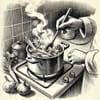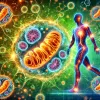Welcome back to our regular feature where we sift through thousands of new, health-related papers, and pick a few to summarize in a practical, simple, and not anxiety-inducing way.
Our main questions on each paper:
- In simple language, what does it say?
- Does it have good evidence?
- Should what it says matter to normal people?
- What simple thing, if anything, could a normal person do to take advantage of this finding?
Okay, away we go. And, as always, we rate each paper for practicality and level of interest, but we are mostly focused on finding ways to simplify findings. And more than anything else, we want to avoid over-optimization, so if a paper is telling you down to the minute how much sunlight to get at dawn, or that you should only drink coffee during eclipses, we are outta there.
This edition's articles and papers:
- Nonlinear dynamics of multi-omics profiles during human aging | Nature Aging https://www.nature.com/articles/s43587-024-00692-2
- Higher ultraviolet light exposure is associated with lower mortality: An analysis of data from the UK biobank cohort study - ScienceDirect https://www.sciencedirect.com/science/article/pii/S1353829224001564
- Assessing muscle quality as a key predictor to differentiate fallers from non-fallers in older adults | European Geriatric Medicine https://link.springer.com/article/10.1007/s41999-024-01020-y
- The Medications That Make Extreme Heat Even Riskier - WSJ https://www.wsj.com/health/wellness/the-medications-that-make-extreme-heat-even-riskier-ff1e9537?mod=hp_lead_pos11
Paper: Nonlinear Ageing Process
Practicality (4/5): 🏃♂️🏃♂️🏃♂️🏃♂️
Interest (5/5): 🏃♂️🏃♂️🏃♂️🏃♂️🏃♂️
Summary
The paper finds that human aging doesn’t occur in a steady, linear fashion but instead shows significant waves and turning points, particularly around the ages of 40 and 60. The study tracked 108 people over several years, monitoring thousands of biological markers to map these changes.
What is the paper's main claim?
- Human aging involves nonlinear changes, with significant molecular shifts occurring around ages 40 and 60.
- Diverse molecular signals from blood, stool, and other samples reveal these complex aging patterns.
Are the methods and/or data it uses appropriate and convincing?
- A sample size of 108 is modest, raising questions about statistical power and generalizability.
- The extended tracking period (up to 6.8 years for some participants) strengthens their findings somewhat, despite the small cohort size.
What do we know now that we didn't know before, if anything?
- We now understand that aging shows sharp, distinct biological changes at certain life stages, rather than being linear and continuous/
What simple and practical thing could a normal person do knowing this?
- Awareness of these critical age windows could influence regular check-ups or lifestyle modifications tailored to one's stage in life
Paper: Sunlight is Good For You
Practicality (4/5): 🏃♂️🏃♂️🏃♂️🏃♂️
Interest (4/5): 🏃♂️🏃♂️🏃♂️🏃♂️
Summary
This study explores the connection between UV exposure and mortality among white European participants in the UK. It found that higher UV exposure correlates with lower risks of death from all causes, cardiovascular disease, and cancer. The results propose that benefits of UV—sun exposure—might outweigh risks, especially in low-sunlight areas.
What is the paper's main claim?
- Higher UV exposure is linked to lower mortality rates.
- UV exposure reduces risks of cardiovascular disease and cancer deaths.
Are the methods and/or data it uses appropriate and convincing?
- Large sample size of over 395,000 participants mitigates random error.
- Methods controlled for multiple confounders, enhancing reliability.
- The effect sizes (15% lower risk of death for solarium users) are meaningful for public health but need careful interpretation.
What do we know now that we didn't know before, if anything?
- UV exposure might extend life by reducing risks of certain diseases.
- Potentially challenges existing public health messages about UV risk.
What simple and practical thing could a normal person do knowing this?
- Moderate sun exposure could be considered beneficial for health, especially in low UV environments like the UK.
Paper: Muscle Quality and Fall Risk
Practicality (4/5): 🏃♂️🏃♂️🏃♂️🏃♂️
Interest (4/5): 🏃♂️🏃♂️🏃♂️🏃♂️
Summary
This paper explores how muscle quality, defined as the ratio of muscle strength to muscle mass, is a key predictor of fall risk in older people. It suggests that improving muscle quality may help in preventing falls more effectively than just increasing muscle mass alone. Falls remain among the most important causes of health spirals with increasing age.
What is the paper's main claim?
- Muscle quality is the best predictor of fall risk in older adults.
- Muscle power and certain gait parameters also play a role but are less significant than muscle quality.
Are the methods and/or data it uses appropriate and convincing?
- The study used a sample of 184 older adults but did not mention adjustments for potential biases in retrospective data.
- Muscle quality and power showed significant differentiation between fallers and non-fallers, but the effect sizes for some measures were small, which may limit generalizability.
What do we know now that we didn't know before, if anything?
- The study reinforces muscle quality as a more reliable indicator of fall risk compared to muscle mass or strength alone.
- It's the first to compare muscle quality directly with other risk factors like muscle power and gait parameters.
What simple and practical thing could a normal person do knowing this?
- Focus on exercises that improve not just muscle mass but also muscle quality, such as resistance training combined with speed and coordination tasks.
Article: Medications and Heat
Practicality (4/5): 🏃♂️🏃♂️🏃♂️🏃♂️
Interest (5/5): 🏃♂️🏃♂️🏃♂️🏃♂️🏃♂️
Summary
Some antidepressants and heart drugs can increase the risk of heat-related illnesses by interfering with the body's ability to regulate temperature. Such risks are particularly relevant during increasingly frequent heat waves, necessitating greater awareness and precaution.
What is the paper's main claim?
- Some antidepressants and heart drugs can impair the body's cooling mechanisms.
- This makes people more prone to heat-related illnesses during heat waves.
Are the methods and/or data it uses appropriate and convincing?
- No new study was introduced, but references were made to a 2020 study on hospitalization risks.
- Methodological specifics from the referenced study are not provided, so the direct effect size and sample size remain unclear.
What do we know now that we didn't know before, if anything?
- The article emphasizes a critical connection between certain medications and heightened heat vulnerability.
- It highlights the need for more public and medical awareness regarding these risks.
What simple and practical thing could a normal person do knowing this?
- People taking medications like antidepressants or beta blockers should stay hydrated and be aware of their less publicized effects.
Back next week with thoughtful and simplifying takes on papers getting attention. And if you see anything you want us to look at, let us know.





